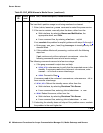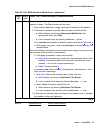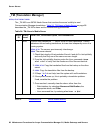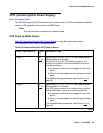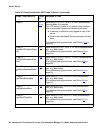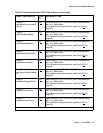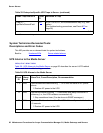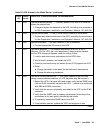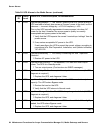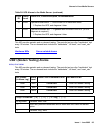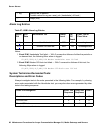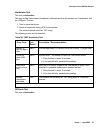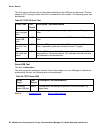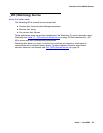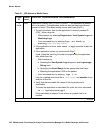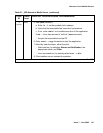
Server Alarms
94 Maintenance Procedures for Avaya Communication Manager 3.0, Media Gateways and Servers
19 WRN “upsAlarmBypassBad” — The “source” power to the UPS, which (during a
UPS overload or failure) also serves as “bypass” power to the load, is out of
tolerance — incorrect voltage by > ±12% or frequency > ±3%.
This on-line UPS normally regenerates its source power into clean AC
power for the load. However, the source power’s quality is currently
unacceptable as bypass power to the load).
1. Verify that the UPS expects the correct “nominal input voltage” from its
power source.
2. If so, restore acceptable AC power to the UPS.
If not, reconfigure the UPS to expect the correct voltage, according to
procedures in its Site Preparation, Installation, and Operator’s Manual,
167-405-035.
20 WRN “upsAlarmLowBattery” — The battery’s remaining run time ≤ specified
threshold.
1. Restore AC power to the UPS.
21 WRN “upsAlarmUpsOutputOff” — As requested, UPS has shut down output
power. The UPS is in Standby mode.
1. Turn on output power. (Can be done via SNMP messages.)
22 WRN “upsAlarmOutputBad” — A receptacle’s output is out of tolerance. (A UPS
diagnosis is required.)
1. Replace the UPS, and diagnose it later.
23 WRN “upsAlarmOutputOverload” — The load on the UPS exceeds its output
capacity. The UPS enters Bypass mode.
1. Reduce the load on the UPS.
2. Verify that the UPS returns to Normal mode.
24 WRN “upsAlarmChargerFailed” — The UPS battery charger has failed. (A UPS
diagnosis is required.)
1. Replace the UPS, and diagnose it later.
25 WRN “upsAlarmFanFailure” — One or more UPS fans have failed. Unless lightly
loaded, the UPS enters Bypass mode.
1. Replace the UPS, and diagnose it later.
Table 26: UPS Alarms to the Media Server (continued)
Event
ID
Alarm
Level
Alarm Text, Cause/Description, Recommendation
3 of 4



